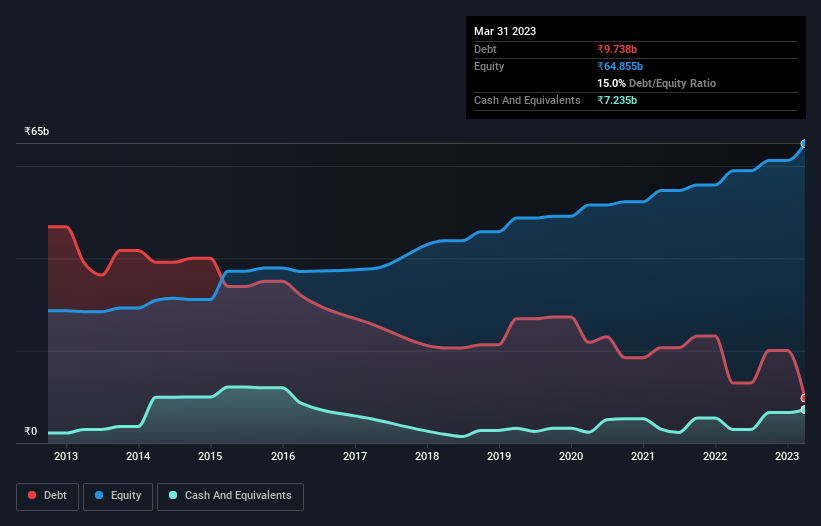- India
- /
- Construction
- /
- NSEI:NCC
These 4 Measures Indicate That NCC (NSE:NCC) Is Using Debt Reasonably Well

David Iben put it well when he said, 'Volatility is not a risk we care about. What we care about is avoiding the permanent loss of capital.' So it seems the smart money knows that debt - which is usually involved in bankruptcies - is a very important factor, when you assess how risky a company is. As with many other companies NCC Limited (NSE:NCC) makes use of debt. But should shareholders be worried about its use of debt?
When Is Debt A Problem?
Debt and other liabilities become risky for a business when it cannot easily fulfill those obligations, either with free cash flow or by raising capital at an attractive price. Ultimately, if the company can't fulfill its legal obligations to repay debt, shareholders could walk away with nothing. While that is not too common, we often do see indebted companies permanently diluting shareholders because lenders force them to raise capital at a distressed price. Having said that, the most common situation is where a company manages its debt reasonably well - and to its own advantage. The first thing to do when considering how much debt a business uses is to look at its cash and debt together.
See our latest analysis for NCC
What Is NCC's Debt?
As you can see below, NCC had ₹9.74b of debt at March 2023, down from ₹13.0b a year prior. However, it also had ₹7.24b in cash, and so its net debt is ₹2.50b.

How Strong Is NCC's Balance Sheet?
According to the last reported balance sheet, NCC had liabilities of ₹98.9b due within 12 months, and liabilities of ₹1.74b due beyond 12 months. Offsetting this, it had ₹7.24b in cash and ₹34.0b in receivables that were due within 12 months. So its liabilities total ₹59.4b more than the combination of its cash and short-term receivables.
This deficit is considerable relative to its market capitalization of ₹81.0b, so it does suggest shareholders should keep an eye on NCC's use of debt. This suggests shareholders would be heavily diluted if the company needed to shore up its balance sheet in a hurry.
In order to size up a company's debt relative to its earnings, we calculate its net debt divided by its earnings before interest, tax, depreciation, and amortization (EBITDA) and its earnings before interest and tax (EBIT) divided by its interest expense (its interest cover). The advantage of this approach is that we take into account both the absolute quantum of debt (with net debt to EBITDA) and the actual interest expenses associated with that debt (with its interest cover ratio).
NCC has a very low debt to EBITDA ratio of 0.17 so it is strange to see weak interest coverage, with last year's EBIT being only 2.4 times the interest expense. So while we're not necessarily alarmed we think that its debt is far from trivial. It is well worth noting that NCC's EBIT shot up like bamboo after rain, gaining 49% in the last twelve months. That'll make it easier to manage its debt. The balance sheet is clearly the area to focus on when you are analysing debt. But it is future earnings, more than anything, that will determine NCC's ability to maintain a healthy balance sheet going forward. So if you want to see what the professionals think, you might find this free report on analyst profit forecasts to be interesting.
Finally, a company can only pay off debt with cold hard cash, not accounting profits. So we clearly need to look at whether that EBIT is leading to corresponding free cash flow. During the last three years, NCC generated free cash flow amounting to a very robust 92% of its EBIT, more than we'd expect. That positions it well to pay down debt if desirable to do so.
Our View
NCC's conversion of EBIT to free cash flow suggests it can handle its debt as easily as Cristiano Ronaldo could score a goal against an under 14's goalkeeper. But we must concede we find its interest cover has the opposite effect. All these things considered, it appears that NCC can comfortably handle its current debt levels. On the plus side, this leverage can boost shareholder returns, but the potential downside is more risk of loss, so it's worth monitoring the balance sheet. The balance sheet is clearly the area to focus on when you are analysing debt. But ultimately, every company can contain risks that exist outside of the balance sheet. For example - NCC has 1 warning sign we think you should be aware of.
Of course, if you're the type of investor who prefers buying stocks without the burden of debt, then don't hesitate to discover our exclusive list of net cash growth stocks, today.
Valuation is complex, but we're here to simplify it.
Discover if NCC might be undervalued or overvalued with our detailed analysis, featuring fair value estimates, potential risks, dividends, insider trades, and its financial condition.
Access Free AnalysisHave feedback on this article? Concerned about the content? Get in touch with us directly. Alternatively, email editorial-team (at) simplywallst.com.
This article by Simply Wall St is general in nature. We provide commentary based on historical data and analyst forecasts only using an unbiased methodology and our articles are not intended to be financial advice. It does not constitute a recommendation to buy or sell any stock, and does not take account of your objectives, or your financial situation. We aim to bring you long-term focused analysis driven by fundamental data. Note that our analysis may not factor in the latest price-sensitive company announcements or qualitative material. Simply Wall St has no position in any stocks mentioned.
About NSEI:NCC
Flawless balance sheet average dividend payer.
Similar Companies
Market Insights
Community Narratives




